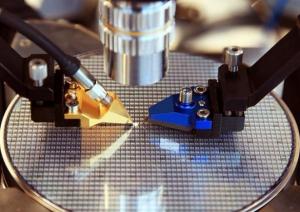
A Seoul National University research team has succeeded in 100 charges and discharges of an all-solid-state battery with a silicon wafer as a negative electrode.
In general, lithium-ion rechargeable batteries for use in EVs use liquid electrolytes and thus are prone to fire and explosion. By contrast, all-solid-state batteries use incombustible solid electrolytes and are higher in energy density.
In a lithium-ion rechargeable battery, graphite is used for the negative electrode. It is replaced with silicon particles in an all-solid-state battery. The powder-based electrode inevitably entails inter-particle air gaps, meaning an increase in resistance blocks intra-electrode lithium movements. This results in a deterioration in performance and service life. This is why commercial all-solid-state batteries are yet to come out.
The university replaced the silicon particles with a silicon wafer to achieve a capacity of 10 mAh per square centimeter as a battery cell unit area. It is 200 percent to 300 percent compared to commercial lithium-ion batteries. The wafer was wet-etched for the purpose of surface roughness adjustment and better wafer-electrolyte contact. The repeated charge and discharge were successfully carried out at room temperature.
The research project was sponsored by the Samsung Group, the Ministry of Science and ICT and the National Research Foundation of Korea. Details can be read in ACS Energy Letters.

